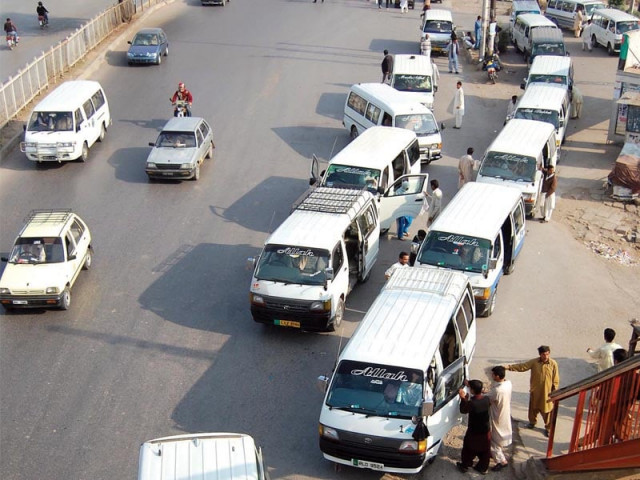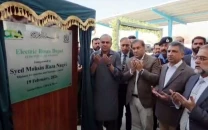In Rawalpindi, a dismal state of public transport
Residents feel buses on inter-city routes can manage the transport mess.

There is no organised inter-city public transport system in place, whether via road or rail, and independent transporters running wagons, pickups and auto-rickshaws are relied upon to fill the void.
The transporters have set 10 routes for wagons and around 12 for pickups in the city, while auto and motorcycle rickshaws rule the old and congested areas, replacing horse carts.

Locals repeatedly complain about transporters overloading their vehicles, especially wagons, in which they use the small space behind the drivers’ seat meant for luggage to accommodate three passengers. The transporters also alter their wagons to add an extra array of seats, severely restricting leg space. A recent survey by The Express Tribune revealed that as many as 21 passengers are being hauled into one wagon that is originally built to seat no more than 14.
Moreover, without a consistent oversight, the transporters repeatedly overcharge commuters and fares skyrocket during the three days (Thursday through Saturday) that CNG stations are closed. On these days, people have to resort to private transport such as taxicabs, which too charge exorbitantly.
But for women passengers, the agony is all the more severe. In the overloaded, leg-space-starved wagons, women passengers are only allowed to be seated next to the drivers’ seat, where at most two can be accommodated. In addition to this limit on travel options for women passengers, which is exacerbated during rush hours and days when CNG supply is suspended, they are often harassed by the transporters and male commuters.
Chief Traffic Officer (CTO) Rawalpindi Ishtiaq Shah said the traffic police have received several complaints about commuters’ problems but very few about harassment of women in public transport. He said it is mainly so because women avoid sharing their issues with the police. He urged women commuters to file complaints with traffic wardens on duty in case they are harassed. He guaranteed that the officials will take immediate action.
However, in case of serious cases such as sexual assault, he suggested it would be better that they report the case in the local police station.
Meanwhile, in the absence of a suitable mode of public transport, people are being forced to purchase their own vehicles, which is increasing traffic and burdening the fragile road infrastructure of Rawalpindi.
According to the motor registration branch of Rawalpindi excise office, every day 10 new private vehicles and six commercial vehicles are registered, while the number of motorcycles stands at around 15. The number is low because most people prefer registering their vehicles in the neighboring Islamabad, which adds to the resale value of their cars and motorcycles.
Proposed solution
“People are being forced to travel in inhuman conditions,” said Sidra Khawar, who regularly commutes on public transport to reach her office in Islamabad. She said if the government introduces buses on busy roads, such as Benazir Bhutto Road, Islamabad Highway and Peshawar Road, it would go a long way in reducing commuters’ woes.
The traffic police concur. “If a systemised bus service is launched in the city, it would ease congestion on roads and the traffic would be much easier to manage, especially during rush hours,” said Haseeb Ahmed, a traffic warden deputed at Marrir Chowk on Benazir Bhutto Road.
But while people as well as the traffic police believe that launching a systemised bus service can manage the city’s transport mess, the Punjab government and the district administration have been unsuccessful in introducing the service or in convincing private transporters to do the same. The closure of Varan Tours, a private bus company that came up to the challenge in 2001 but suspended its operations after four years due to ‘differences’ with the city and provincial authorities, has not helped their odds.
Case of the defunct Varan Tours
When contacted, Uzma Gul, the owner of Varan Tours, said the bus service was shut down because the provincial or district government “failed to provide protection to its vehicles and staff.” During the first 47 days of operation of Varan Tours, 177 incidents of damage to buses and thrashing of staff members were reported on different routes, she elaborated.
Uzma, the daughter of former ISI chief Lieutenant General (retd) Hameed Gul, said in order to continue the service, the company negotiated with the transport authorities of Punjab to provide at least Rs700,000 each for the repair of its fleet of 100 buses. However, the government was not willing to pay more than Rs400,000 for the repair of each bus. When there was no settlement, the service was shut down.
Gul said there are a number of cases pending in courts as the Punjab government claimed Rs4.5 billion in compensation from Varan Tours for suspending its service, whereas the company sought Rs4 billion in damages from the government for not providing security to its staff and vehicles. She added that the cost of damages was estimated in 2009 and as prices have gone up since, so will the settlement amount.
The government’s stance
A former Regional Transport Authority (RTA) secretary, requesting anonymity, said the provincial government has been unwilling to launch a bus service due to its experience with the Government Transport Service (GTS), the last state-run bus service in Rawalpindi that used to operate on the busy Muree Road. GTS was shut down in 1998 due to increasing maintenance and operation costs, said the secretary, adding that by the end, the GTS was termed a “white elephant.” He said that soon after, independent transporters operating Bedford and Mazda buses also met the same fate.
The secretary said that time and again the government has tried to convince transporters to operate buses instead of wagons and pickups, but the large investment and high maintenance and fuel costs keep them at bay. Moreover, investors feel that buses are a risky investment as after a couple of years of operation they are not fit to ply intra-district routes and cannot be refurbished and reused as in the case of the smaller vehicles.
“I admit, it has been difficult to persuade transporters to run buses instead of smaller vehicles,” Rawalpindi District Coordination Officer (DCO) Saqib Zafar said. However, he said a new bus service has recently been introduced between Gujar Khan and Rawalpindi’s Raja Bazaar and hoped that a similar service could soon be launched for inter-city routes.
The Punjab government has procured 50 diesel buses, each at a cost of Rs10 million, and wants independent transporters to ply them in Rawalpindi, said an official. He said a group of investors recently held a meeting with secretary transport in Lahore, where they were informed that the government would provide 25 per cent subsidy on the cost of each bus. The transporters can pay 25 per cent of the cost in advance and the rest can be paid in installments extending up to four years, he added.
He said the provincial government feels that the 25 per cent subsidy will provide enough incentive to the transporters and ward off their fear of investing in buses. Do the transporters feel that same? Only time will tell.
Published in The Express Tribune, December 17th, 2012.



















COMMENTS
Comments are moderated and generally will be posted if they are on-topic and not abusive.
For more information, please see our Comments FAQ